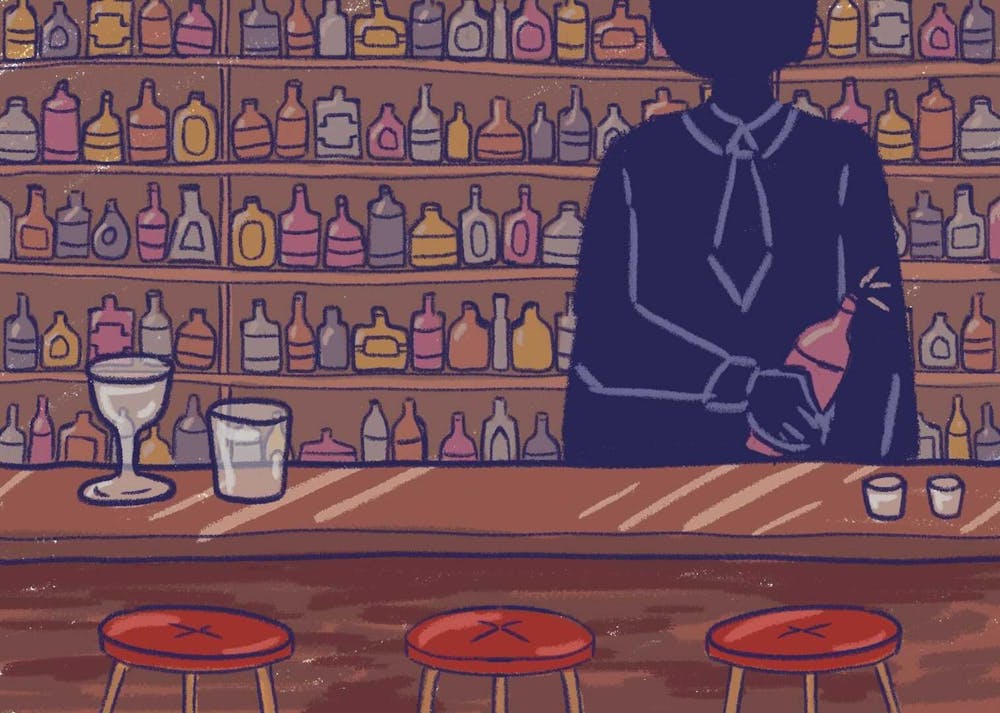"You can do all the things right, and frankly you shouldn't have to do all the things right, and things will still happen to you."
Savannah Hine, a fourth-year communications student, has experienced the nightlife of Phoenix and Tempe, from dance floors to gay bars and uncomfortable expectations from strangers, watching her drink while sitting at the bar. But she describes the one and only safety measure she has as a hesitant glance toward her friends, what she calls the "I'm uncomfortable" look, that hinges on the hope that they recognize her "I need help" body language.
Her experience, among many others, express a need for sexual harassment and assault prevention in bars.
In 2019, the Arizona Safer Bars Alliance (ASBA) began its National Institutes of Health (NIH) study to test the efficacy of their program; however, since then, a rising social conversation regarding sexual assault has made their study more widely discussed than ever.
According to a report by the Centers for Disease Control and Prevention, there has been more coverage of sexual violence in media recently in comparison to earlier years. In 2017 specifically, there was a shift: mentions of rape and sex trafficking in media decreased while mentions of sexual harassment increased. This change led media to talk more about sexual harassment.
ASBA is a statewide initiative of the Arizona Department of Health Services and UA. Their goal is to prevent sexual assault common in alcohol-serving establishments by training bar staff and creating a safer drinking environment.
The NIH study focuses specifically on bars within a one mile radius of the three major college campuses in Arizona: NAU, ASU Tempe and UA.
Articles, Instagram posts, and TikTok videos have helped shed light on recent incidents at Phoenix bars.
Brett Boyles, co-owner of Thunderbird Lounge, was arrested on Sept. 14 for domestic violence assault after leaving work intoxicated. Even though this incident happened outside of their bar, the news raised questions on bar safety in general.
Elise Lopez, co-investigator for the study, director of the UA Consortium on Gender-Based Violence and assistant professor of practice, said the study is focused around college campuses because college students are more likely to engage in risky behaviors — unsafe sexual behavior, binge drinking and other substance use — making them a high risk population for sexual assault.
"We want to saturate all those bars with the prevention program and see if, over time, it makes a difference in how often the bar staff intervene and also look if there's any change in police reports of crime," she said.
According to Lopez, in previous studies researchers have found that areas with high density of bars correlate to high number of police reports for violence. They mapped out liquor license data and overlapped where police reports were made, and the two factors correlate strongly.
"I like that their focus is near college campuses because college campuses don't really address it," Hine said of the study. "If a woman is attacked — like in the Brock Turner case — it's glazed over until it's a problem they have to address. Methods like LiveSafe are not quite enough, so I’m hoping if the bars near college campuses pay attention to it, maybe colleges will too."
So far, ASBA managed to enroll seven bars for the study: two bars in the Tempe/Phoenix area, one in Flagstaff and four in Tucson.
According to Karyn Roberts, UA research professional and research manager for the NIH study, most enrollments occurred this year, from June to today.
The ASBA bar training takes place over two sessions. The first session is two and a half hours and covers bystander intervention, rape myths, statistics, and alcohol and drug facilitated sexual assault.
Identification and intervention skills aren't taught until the second session.
"You need time for people coming into these trainings to believe that it's relevant to them," Lopez said. "We can teach people skills until the cows come home, but if they don't feel that it's relevant to them, if they're not bought into the concept that sexual aggression occurs in bars and that it's their responsibility to deal with it, they're not gonna use those skills."
The second session is another two and a half hours and involves working on observation skills, identifying sexual aggression and intervention skills. ASBA also does a risk assessment of each bar by asking about pricing policies, promotions, names of drinks and analyzing the physical environment — checking if the music is too loud, if the lighting is too low and if there are places where patrons are not visible.
Oliver Adams, director of people and culture at Mother Road Brewing Company in Flagstaff, has seen this rise first hand, but their bar has taken the initiative to get ASBA training since 2017.
Then, ASBA addresses the physical environment issues by encouraging bars to play the music quieter, get better lighting, and rearrange the furniture to build an environment that makes it harder for people to perpetrate sexual aggression.
"Our crew feels more confident and empowered to not only act, but be proactive," Adams said. "They're really good at trying to catch a scenario before it gets escalated, and I think that's the most important thing."
Hine suggested it could also be helpful to have bouncers on dance floors keeping watch or trained bar staff who could handle someone who has been roofied. She said installing night vision cameras and letting patrons know they are recording may disincentivize perpetrators and could be a solution to not compromising bar environments.
ASBA's training is free and bars can join the NIH study at any time. ASBA also includes monetary incentives to help the bars pay their staff for training. On top of that, they offer Amazon gift cards to any staff willing to do their online, confidential surveys.
Adams said the cost benefit is a "no-brainer" to their bar.
ASBA started recruiting bars and refining the curriculum using leading prevention science in late 2019 up until March 20, 2020, when bars were ordered to shut down due to COVID-19.
According to Lopez, the team working on the NIH study took a year-long hiatus from recruiting any bars because of quarantine, yet maintained contact with bars they've trained in the past.
Kelly Davis, co-principal investigator for the study and associate professor at the ASU Edson College of Nursing and Health Innovation, said the pandemic set them behind on data collection. ASBA hopes to start data analysis in the spring of 2022.
ASBA also hopes to get a year extension from their funder, NIH, in order to collect more data and compensate for the delay.
"It's been slower than we'd like," Davis said. "We are reaching out to bars everyday, but if there are bars that are interested, we would love to work with them and talk with them more about this study."
Lopez found bar reopenings actually work to their advantage as many establishments are hiring and training new staff.
"A lot of owners haven't really thought of violence prevention as something that should be in their onboarding procedures, so it's a unique time for us to approach them and encourage them to add this into their onboarding," she said.
The pandemic also forced them to reevaluate their study and propose new questions regarding sexual assault and COVID-19.They now have to take into account every bar's COVID-19 precautions so they understand how the environment might be affected.
"If we're not seeing as much sexual aggression in the bars, we want to know if there really isn't sexual aggression happening or if there's this new variable, that there's not as many people and not as much opportunity for aggression to happen," Lopez said. "We've had to ask them about their protocols and try to work that into our analysis. It's a whole new ball game."
Another result from the rise of sexual assault discussions is that Safer Bars training has become more widespread. Lopez said organizations around the country are starting to conduct similar bar training and asked to use ASBA's curriculum. She said New York uses the five hour training plan throughout the state.
Other organizations create their own bar training, and bars come up with little ways to keep patrons safe.
Low Key Piano Bar in Tempe hung signs in the women's restroom instructing women to order an angel shot if they need help getting out of an uncomfortable situation.
The problem, however, is certain training gives bars a false sense of security and accomplishment. A one hour session may not be enough to train staff to prevent sexual violence, Lopez said.
"Repetition and multi-session programs are the gold standard for violence prevention … I really hope that we'll see more bars in Arizona step up to be leaders and do the five hour Safer Bars training that's specific to Arizona and that we think really makes a difference."
In speaking about bars' role in the safety of their atmosphere Adams said, "These things are a little archetypal. Alcohol affects behavior and as an alcohol serving establishment, they have a responsibility in that and their responsibility is not going to go away."
"No one's gonna stop drinking, prohibition is proof of that, but maybe if we can train people to notice these things, it might help," Hine said.
According to Lopez, Arizona's strong networks of bars has contributed to making Arizona one of the leaders in considering training for sexual violence prevention. A decade ago, when the ASBA program first started, there wasn't as much public awareness about sexual assault in bars. Arizona was early in identifying the issue and creating opportunities for intervention and prevention.
"I would encourage people to ask their favorite bars if they have been trained in Safer Bars or have heard about the Arizona Safer Bars Alliance," Lopez said. "The more that we can get people asking, the more bars will actually want to sign up for it knowing that their patrons want it."
Reach the reporter at savannah.dagupion@gmail.com and follow @savdagupion on Twitter.
Like State Press Magazine on Facebook and follow @statepressmag on Twitter and Instagram.
Continue supporting student journalism and donate to The State Press today.

Savannah is a senior studying journalism with a minor in English. This is her eighth semester with The State Press. She has also worked at the Lonely Planet and Write On Downtown.




